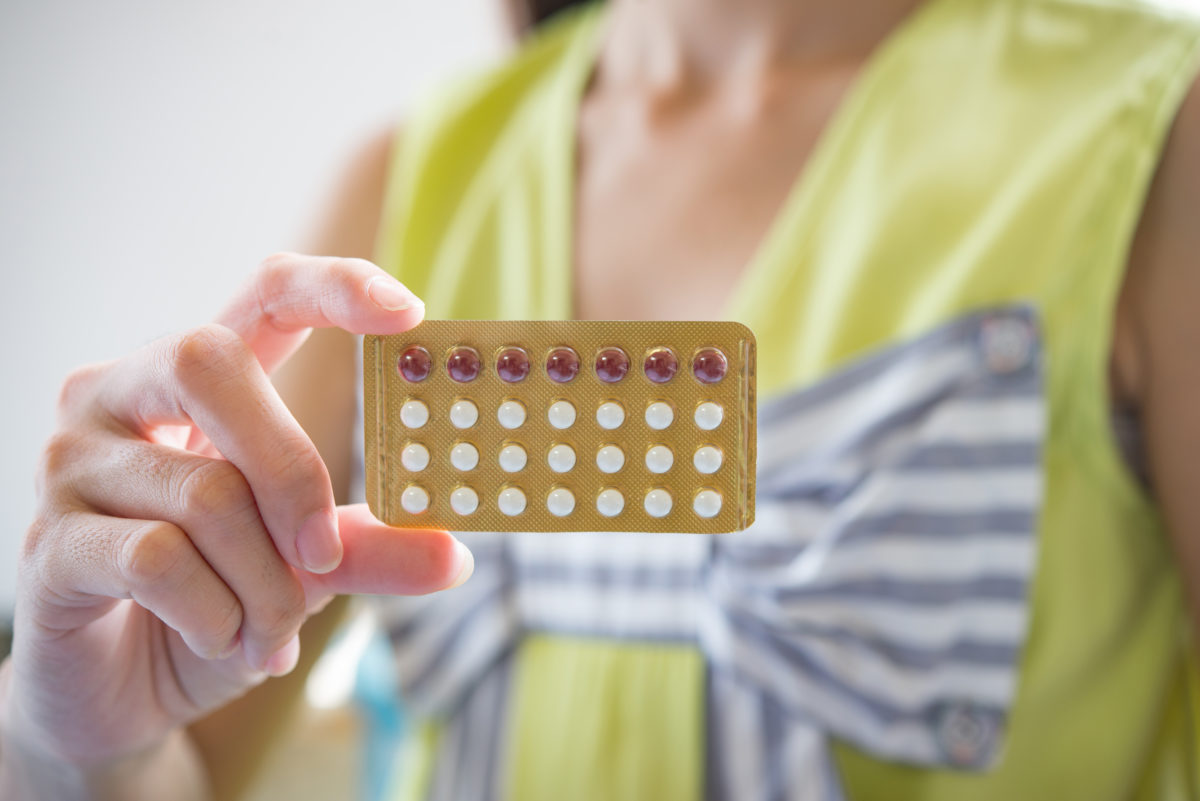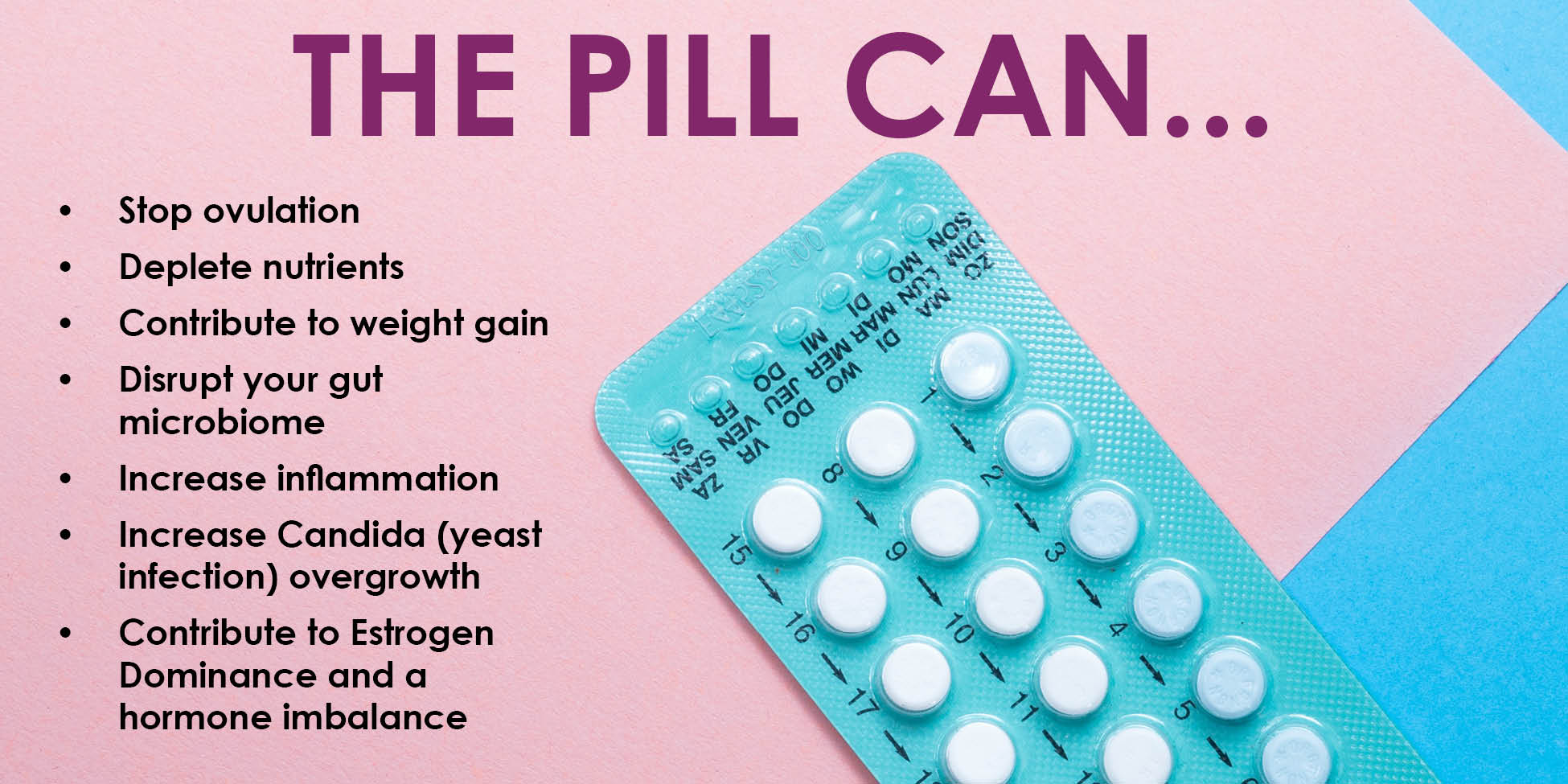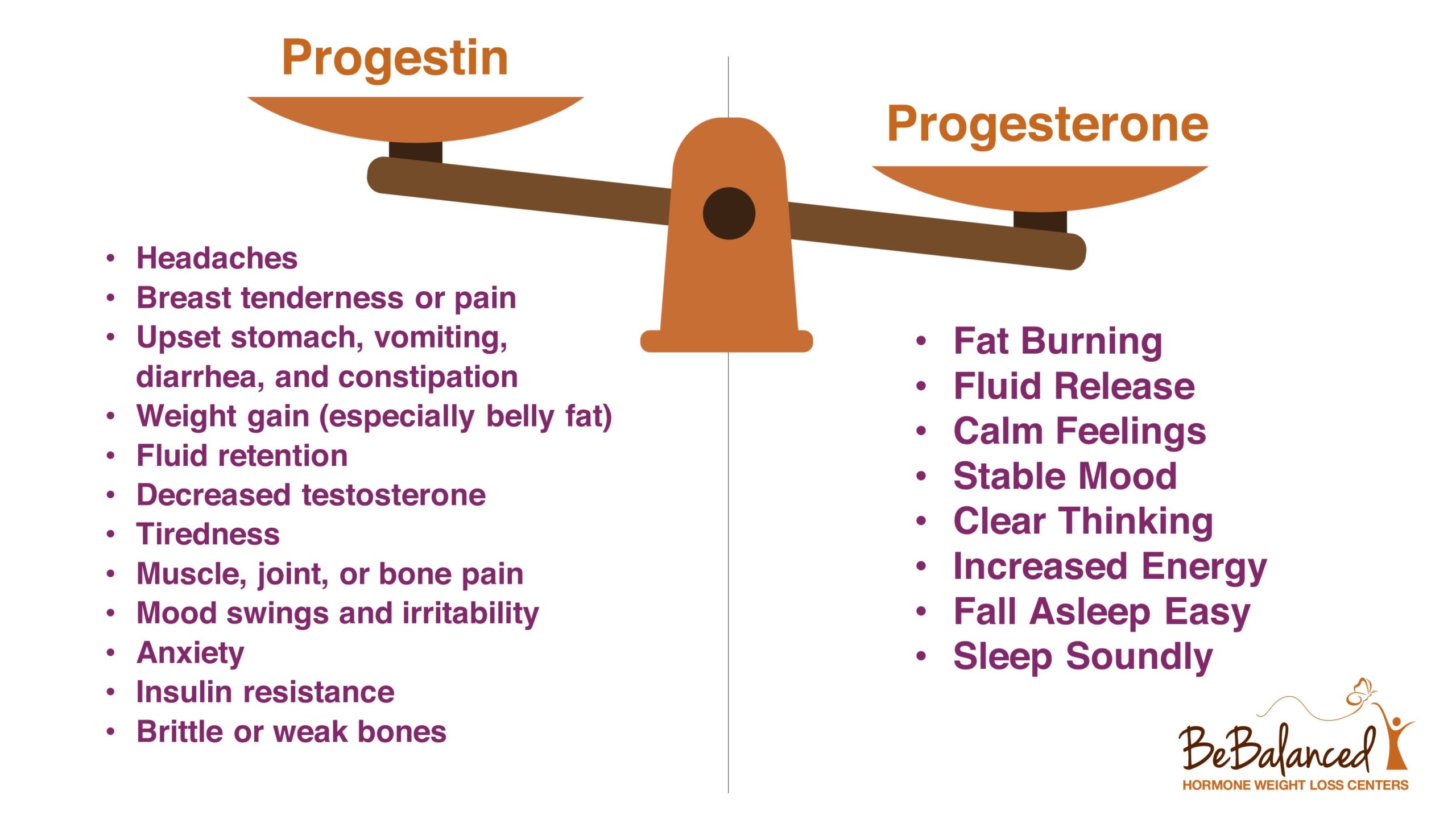
Picture this, a young girl starts experiencing heavy periods, irregular cycles, chronic acne, and cramps, and her doctor tells her that the birth control pill will make all these symptoms go away, so she hops on board. “I mean, they’re the expert, right?”
Or how about this, a woman in her late 30s or early 40s is experiencing perimenopausal symptoms like irregular bleeding, mood swings, hot flashes, and night sweats. Her OB/GYN writes her a script for the birth control pill to alleviate her symptoms and she thinks, “Well, my doctor knows best, right?”
Unfortunately, what many doctors do not talk about are all the ways synthetic hormonal birth control options (like “the pill”) can impact your health in both the short-term and the long-term.
Birth control pills do not “fix” hormone related issues.
Although it’s extremely common for doctors to recommend the pill (or patch, or ring, or shot) to “fix” PMS and other hormone related symptoms, the truth is, birth control doesn’t solve these issues, it hides them, acting like a band aid covering a deeper wound and fails to address the underlying root issue.
Birth control will not “fix” your irregular, heavy, painful periods.
It will not “fix” your acne or cramps.
And it will not “fix” symptoms related to peri or post menopause.
Here’s what the pill WILL do:
- Stop ovulation
- Suppress hormones necessary for optimal thyroid, gut, liver, and brain function
- Deplete nutrients
- Contribute to weight gain
- Disrupt your gut microbiome
- Increase inflammation
- Increase Candida (yeast infection) overgrowth
- Contribute to Estrogen Dominance and a hormone imbalance

Synthetic birth control will not “fix” hormone related issues and can cause estrogen dominance, leading to weight gain and more.
Some of the beliefs on what birth control can help comes from a sheer lack of information or misinformation – and that’s okay. BUT BeBalanced is here to change the narrative.
Before we get into the side-effects of the pill, and offer more natural alternatives, let’s go over a brief understanding of what birth control pills are or, more importantly, the risks they carry.
What are birth control pills and what are they made of?
Birth control pills are a type of hormone replacement therapy (HRT) that contain man-made, synthetic hormones. They are intended to stop ovulation, disrupting the natural hormonal cycle. Birth control pills work by “tricking” the body into thinking it’s pregnant to prevent the ovaries from releasing an egg.
There are two types of birth control pills: Combination pills that contain synthetic forms of estrogen and progestin (a synthetic form of progesterone), and progestin-only pills.
The dangers and side-effects of birth control pills.
Synthetic hormones (or HRT) in any form can cause havoc on the body, disrupting your natural hormone balance, causing a domino effect across your endocrine system.
Synthetic hormones are not recognized or broken down by the body the same way natural hormones are. Despite a high number of medical studies and this substantial, clinical evidence showing the potential health risks associated with synthetic hormones, many doctors readily prescribe them as a “solution.”
Synthetic Estrogen
The purpose of synthetic estrogen in combined hormonal birth control is to make bleeding predictable. Without it, progestin-only methods can cause unpredictable changes in menstrual bleeding. So essentially, synthetic estrogens are added to these types of contraceptives to make your “withdrawal bleed” look more like a “normal period”.
Important side note: The “period” you are experiencing? It’s not a real period.
Synthetic estrogen can cause:
- Breast tenderness
- Weight gain (particularly visceral fat)
- Fluid retention/bloating
- Nausea
- Decreased testosterone and DHEA
- Increased risk of cardiovascular disease
- Increases in blood clot risk
- Increased risk of certain breast cancers
- Insulin resistance
- Inflammation
- Decreased muscle mass
- Increases cravings
- Migraines
- Estrogen Dominance
Synthetic Progesterone (Progestin)
Progestin is the synthetic form of the body’s natural produced hormone progesterone. However, it is far from equal. Naturally produced progesterone helps to balance out blood pressure and blood sugar levels. It is a fat-burner and diuretic that helps soothe mood, nurtures sleep, and calms PMS and menopausal symptoms.
Unlike progesterone, progestin has been shown to cause:
- Headaches
- Breast tenderness or pain
- Upset stomach, vomiting, diarrhea, and constipation
- Weight gain (especially belly fat)
- Fluid retention
- Decreased testosterone
- Tiredness
- Muscle, joint, or bone pain
- Mood swings and irritability
- Anxiety
- Insulin resistance
- Brittle or weak bones

Progesterone vs. Progestin
Birth Control Alternatives
Birth control is typically prescribed for two reasons, the most obvious – to prevent pregnancy, but it is also used to “treat” hormone related issues. At BeBalanced, we believe that all symptoms of PMS and menopause are caused by a hormone imbalance and cannot be “fixed” with synthetic hormones (which we will discuss further down).
It’s common for our clients to tell us they won’t quit the pill because they’re scared to become pregnant. Considering the plethora of misguided education girls are given in grade school (compiled with the belief that periods are a mysterious problem best left to medication to try to manage) this can feel like a legitimate fear!
The good news is, when used correctly, there are a variety of non-synthetic birth control options to consider, including:
Condoms:
Now we know you might be thinking, “A committed relationship is no place for condoms.” But condom-less sex doesn’t need to be a sign of love and trust. When used correctly, condoms have a 98 percent effectiveness rate.
Track your cycles with your basal body temperature:
Three days before you start ovulating, your body temperature rises slightly. There are a number of devices and apps to help you track your cycles and basal body temperature helping you chart when to avoid intercourse over the days you are ovulating. Note, tracking your cycles is also a great way to get in tune with your body’s natural rhythm throughout the month. Keep in mind that this method of birth control holds the highest risk of an unplanned pregnancy.
Diaphragms:
Typically, diaphragms must be fitted by a doctor and are about 88 to 94 percent effective at preventing pregnancy. However, a product called Caya is available by prescription, but you no longer need to find a doctor who knows how to do a fitting.
Non-hormonal Copper IUD:
The copper IUD is a non-hormonal device that, after insertion, is approved for 12 years of use and can be easily removed if you are trying to get pregnant. The American college of obstetrics and gynecology recommends this as the best form of birth control for all ages. Although rare (and combined with other environmental factors) some women can experience complications with copper toxicity. Copper IUDs are 99 percent effective.
A word on Progestin IUDs
Although still synthetic, unlike other forms of birth control (such as the pill, patch, ring, or shot) where progestin impacts the whole body, a progestin IUD acts locally where inserted, only impacting the uterus. Therefore, the side-effects of progestin IUDs are very minimal as opposed to other forms of synthetic birth control. The 3 types of IUDs that use the hormone progestin include Mirena, Skyla, and Liletta. Progestin IUDs are 99 percent effective.
If you are using a progestin IUD as a means of birth control, simple adjustments to your diet, natural supplementation, and lifestyle choices can help to combat any effects the IUD may have on your overall hormone health.
Addressing the root cause of PMS and Menopausal Symptoms.
At BeBalanced, we believe that all symptoms of PMS and menopause are caused by a hormone imbalance, which cannot be “fixed” with synthetic hormones.
Synthetic birth control adds “fake” estrogen on top of excess estrogen in the body without the balance of natural progesterone (contributing to what is called estrogen dominance). On top of that, the synthetic version of progesterone, progestin, adds to the symptoms of estrogen dominance.
Symptom of estrogen dominance include:
- Difficulty Losing Weight
- Mood Swings/Irritability
- Low Energy Levels
- PMS Symptoms
- Fluid Retention/Bloating
- Hot Flashes/Night Sweats
- Lack Of Libido
- Headaches/Migraines
- Depression/Anxiety
- Thinning Hair
- Thyroid Issues
- Vaginal Dryness
- PCOS
- Brain Fog/Lack of Concentration
- Insomnia/Waking up at Night
- Endometriosis/Fibroids
- Inflammation, Aches, and Pains
- Constipation
BeBalanced exists to help women naturally balance hormones for happier periods, timeless beauty, clearer skin, and overall healthier bodies inside and out!
We empower women with the tools to live their best, most vibrant lives. Women who refuse to accept that their quality of life is bound to diminish just because the clock keeps ticking, or that it’s “that time of the month.”
We do this through natural hormone balancing, a revolutionary way to work with your body to naturally balance key hormones that impact your weight, mood, sleep, energy, and so much more.
If you want to truly get to the root of your hormone related symptoms and see lasting change, you need to focus on:
- Nutrient dense, whole foods
- Balancing insulin
- Gut repair
- Liver detoxification support
- Thyroid support
- Stress management
- Self-care
- Support
BeBalanced can help!
To learn more about our natural approach to hormone health, schedule a free (virtual or in-person) consultation at any of our centers nation-wide. Together we can help you uncover and correct the root cause of your PMS and menopausal symptoms naturally!
Think you might have a hormone imbalance?
Take our free hormone assessment!
Be well!

